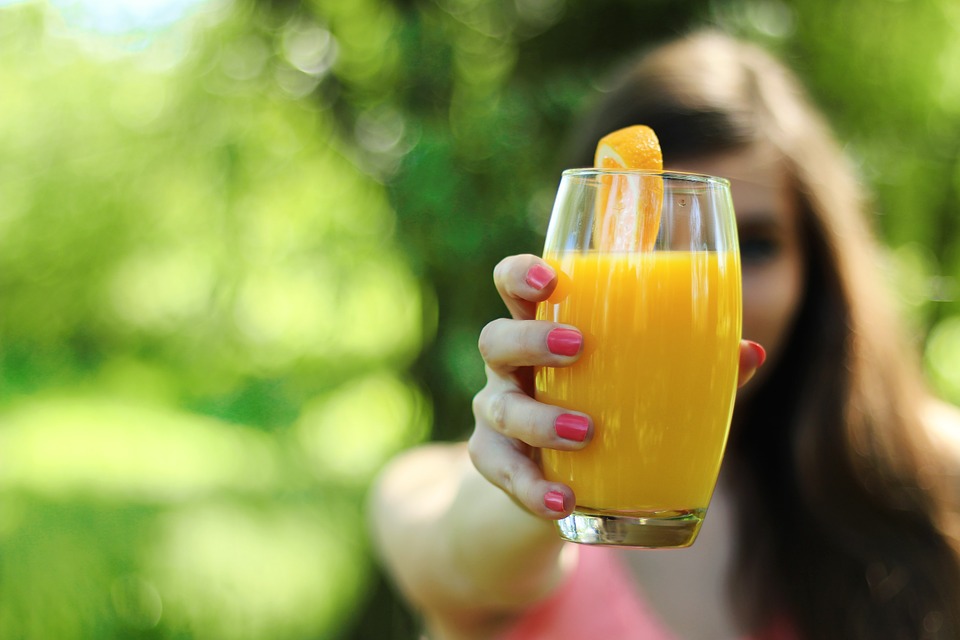A Single Glass of Orange Juice Boosts Cognitive Function and Conscious Mental Activity
In terms of antioxidant prowess, oranges are a highly underrated fruit. They contain rich sources of carotenoids, flavonoids and vitamin C. A University of Reading (UK) report shows that a single glass of flavonoid-rich orange juice may boost cognitive function, compared to placebo.
Data published in the European Journal of Nutrition indicated that a 240 ml glass of the flavonoid-rich orange juice was associated with significantly improved scores for attention, executive function, and psychomotor speed in healthy middle-aged men without mild cognitive impairment six hours after consumption, compared with placebo.
Orange juice contains lutein and zeaxanthin, compounds believed to play an important role in preventing age-related macular degeneration (loss of vision) and cognitive impairment in the elderly.
Although orange juice has also been criticized in the past because of its high intrinsic sugar level, being associated with a higher risk of type 2 diabetes, recent intervention studies demonstrated the health benefits of long-term orange juice consumption, such as an increased total antioxidant status, lower total cholesterol levels, and the prevention of endotoxin increases after meals high in fat and carbohydrate.
Widget not in any sidebars
Stick To Fresh
Pasteurized orange juice shows diminished carotenoid and vitamin C levels, by up to 20% so it’s important for consumers to consume freshly squeezed orange juice whenever possible.
Ever wonder why commercial orange juice–even the premium, not-from-concentrate, “100-percent pure” juice kind–tastes the same each time you buy it, but doesn’t taste exactly like a freshly peeled orange?
Turns out there’s a lot more to making juice than simply squeezing some citrus. As part of the mass-production process, big-name brands like Tropicana, Minute Maid, Simply Orange, and Florida’s Natural add artificial flavouring in order to make sure your juice tastes consistent from carton to carton–and to make sure it tastes like oranges.
Carotenoid bioaccessibility — how easily the body can absorb the nutrients also differs from person to person. The same bioaccessibility is also enhanced from 10% in oranges to almost 30% in freshly squeezed orange juice. Flavonoid bioaccessibility was boosted almost five-fold to 96.5%.
“It is important to acknowledge that orange juice consumption was not associated with a significant improvement on every individual cognitive test; this would not be expected given that the effects of nutritional interventions on cognitive performance are small and difficult to detect in healthy adults,” wrote the researchers.
“However, consistently higher means were observed following orange juice relative to the placebo in the vast majority of outcomes.”
Study Details
 The researchers recruited 24 healthy men aged between 30 and 65 to participate in their randomized, double-blind, crossover study. The men were randomly assigned to consumer orange juice containing 272 mg of flavonoid or a calorie-matched placebo, with the interventions separated by two weeks.
The researchers recruited 24 healthy men aged between 30 and 65 to participate in their randomized, double-blind, crossover study. The men were randomly assigned to consumer orange juice containing 272 mg of flavonoid or a calorie-matched placebo, with the interventions separated by two weeks.
A battery of tests revealed that, compared to placebo, the flavonoid-rich orange juice was associated with significantly better performance on tests of executive function and psychomotor speed.
Alertness was also reportedly improved following orange juice consumption.
Mechanism?
Bioavailability data would suggest that the cognitive benefits observed after six hours are related to the flavanones hesperidin and narirutin, said the researchers.
“One plausible hypothesis is that flavonoid consumption may lead to acute cognitive benefits via increased [cerebral blood flow] as a result of enhanced endothelial function and increased bioavailability of nitric oxide,” they wrote. “Human studies show significantly increased [cerebral blood flow] several hours following cocoa flavanol consumption. These are supported by chronic studies which show increased activation in the right middle prefrontal cortex and the right superior parietal cortex following anthocyanin and flavanol-rich grape juice consumption.
“Moreover, increased steady-state-evoked potentials in posterior parietal and central-frontal regions and increased [cerebral blood flow] in the hippocampus during a spatial memory task have been observed following several weeks daily consumption of cocoa flavanols. As yet, there are no published data examining peripheral or [cerebral blood flow] in humans following flavanone consumption; therefore, these potential mechanisms are speculative at this time.
To conclude, the authors stated: “These data demonstrate that fruit juice-based flavonoids can acutely enhance cognition in healthy adults. This is consistent with the accumulating evidence from chronic interventions and epidemiological research that increased consumption of fruits, fruit juices and other flavonoid-rich foods over the lifespan is associated with cognitive benefits such as a reduced risk of neuropsychological disease, attenuation of aging-induced cognitive decline and maintenance of optimal cognitive facilities.”
Also Read: Orange Juice Shelf-Life May Be Extended Without Dangerous Preservatives
Natasha Longo writes for PreventDisease.com, where this article first appeared.
Image: Pixabay.com



